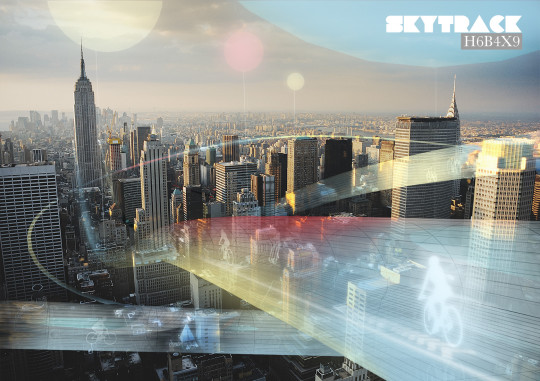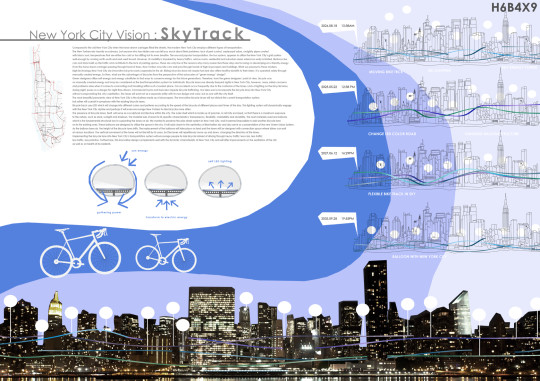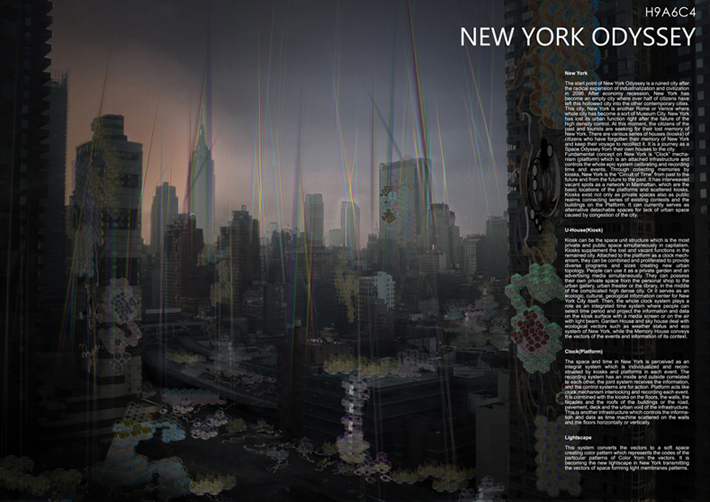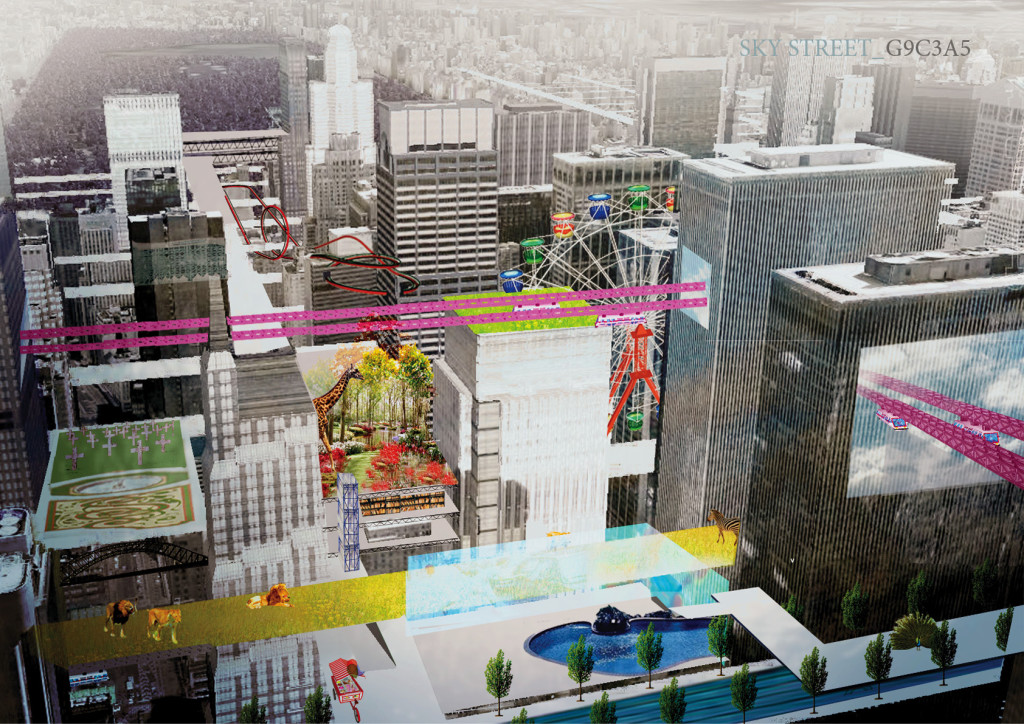Info:
Title: Skytrack - Code: H6B4X9Contest: NY / 2012
By: Y. Suk Lee - Y. Ham
Views: 2708 Likes: 0
Votes:
JOSHUA PRINCE-RAMUS2 EVA FRANCH I GILABERT2 ROLAND SNOOKS3 SHOHEI SHIGEMATSU0 ALESSANDRO ORSINI1 MITCHELL JOACHIM11.5
Skytrack

 NEW YORK CITY VISION: S K Y T R A C K Looking up at the sky after a rain; Wind, balloons, bicycles and New York City… Compared to the oldNew York Citywhen the horse drawn carriages filled the streets, the modernNew York Cityemploys different types of transportation. The New Yorkers rely heavily on subways, but anyone who has ridden one can tell you much about their problems: lack of pest control, unpleasant odors, unsightly pipes coated with black soot, temperatures that are either too cold or too stifling hot to even breathe. The second popular transportation, the bus system, appears to utilize theNew York City’s grid system well enough by running north-south and east-west bound. However, its mobility is impaired by heavy traffics, narrow roads, residential and suburban areas where bus entry is limited. Motorcycles, cars and taxis build up the traffic and contribute to the lack of parking spaces. These are only few of the reasons why many researches these days are focusing on developing eco-friendly energy.
NEW YORK CITY VISION: S K Y T R A C K Looking up at the sky after a rain; Wind, balloons, bicycles and New York City… Compared to the oldNew York Citywhen the horse drawn carriages filled the streets, the modernNew York Cityemploys different types of transportation. The New Yorkers rely heavily on subways, but anyone who has ridden one can tell you much about their problems: lack of pest control, unpleasant odors, unsightly pipes coated with black soot, temperatures that are either too cold or too stifling hot to even breathe. The second popular transportation, the bus system, appears to utilize theNew York City’s grid system well enough by running north-south and east-west bound. However, its mobility is impaired by heavy traffics, narrow roads, residential and suburban areas where bus entry is limited. Motorcycles, cars and taxis build up the traffic and contribute to the lack of parking spaces. These are only few of the reasons why many researches these days are focusing on developing eco-friendly energy.
From the horse drawn carriages passing through forest of trees, New Yorkers now ride cars and pass through forests of high skyscrapers and buildings. What we propose to these modern, high-technologyNew York Cityare innovative bicycle roads suspended in the air. Riding bicycles does not require fuel and also offers healthy benefits to their riders. It is operated solely through manually created energy. So then, what are the advantages of bicycles from the perspective of the advocates of “green energy” design?
Green designers utilize self-energy and energy substitutes to find ways to conserve energy for the future generations. Therefore, from the green designers’ point of view, bicycle runs on manually created energy and may be considered as the best transportation system for individuals. Bicycle lanes are already frequent sights inNew York City, however, many safety concerns and problems arise when it comes to commuting and travelling within such crowded place. Car accidents occur frequently due to the confusion of the lanes. Lack of lighting on the bicycle lanes, during night, poses as a danger for night time drivers. Commercial trucks and taxis also impede bicycle trafficking. Our idea was to incorporate the bicycle lane intoNew York Citywithout compromising the city’s aesthetics. The lanes will exist not as a separate entity with its own design and color, but as one with the city itself. The most beautiful panoramic view ofNew York Cityis the skylines made up of skyscrapers. The innovative bicycle lanes will not disturb the current transportation system, but rather will coexist in symphony with the existing bicycle lanes.
Bicycle track uses LED which will change into different colors and patterns according to the speed of the bicycle at different places and times of the day. This lighting system will dynamically engage with theNew York Cityskyline and perhaps it will even encourage New Yorkers to ride bicycles more often.
The presence of bicycle lanes, itself, will serve as a sculptural architecture within the city. The outer shell which is made up of polymer, is not fully enclosed, so that there is a maximum exposure to the nature, such as wind, sunlight and shadows. The material was chosen for its specific characteristics; transparency, flexibility, moldability and durability. The next materials used are balloons, which is the fundamental structural key to supporting the lanes on air. We wanted to preserve the prior street system inNew York City, and it seemed impossible to add another bicycle lane on to the existing ones. These balloons are designed to utilize the space in the sky. It will add charm to the aesthetics ofManhattansky and also serve as a presentation of the new Green Urban System.
As the balloon loses air, the height of the bicycle lane shifts. The replacement of the balloons will take place on land and the lanes will be designed with connection space where bikers can exit at various locations. The vertical movement of the lanes will not be felt by its users, but the lanes will repetitiously move up and down, changing the direction of the lanes.
Implementing the bicycle lane intoNew York City’s transportation system will encourage people to ride bicycle instead of driving through heavy traffic; less cars, less traffic; less traffic, less pollution. Furthermore, this innovative design complements well with the dynamic characteristic ofNew York Cityand will offer improvements on the aesthetics of the city as well as on health of its residents.






